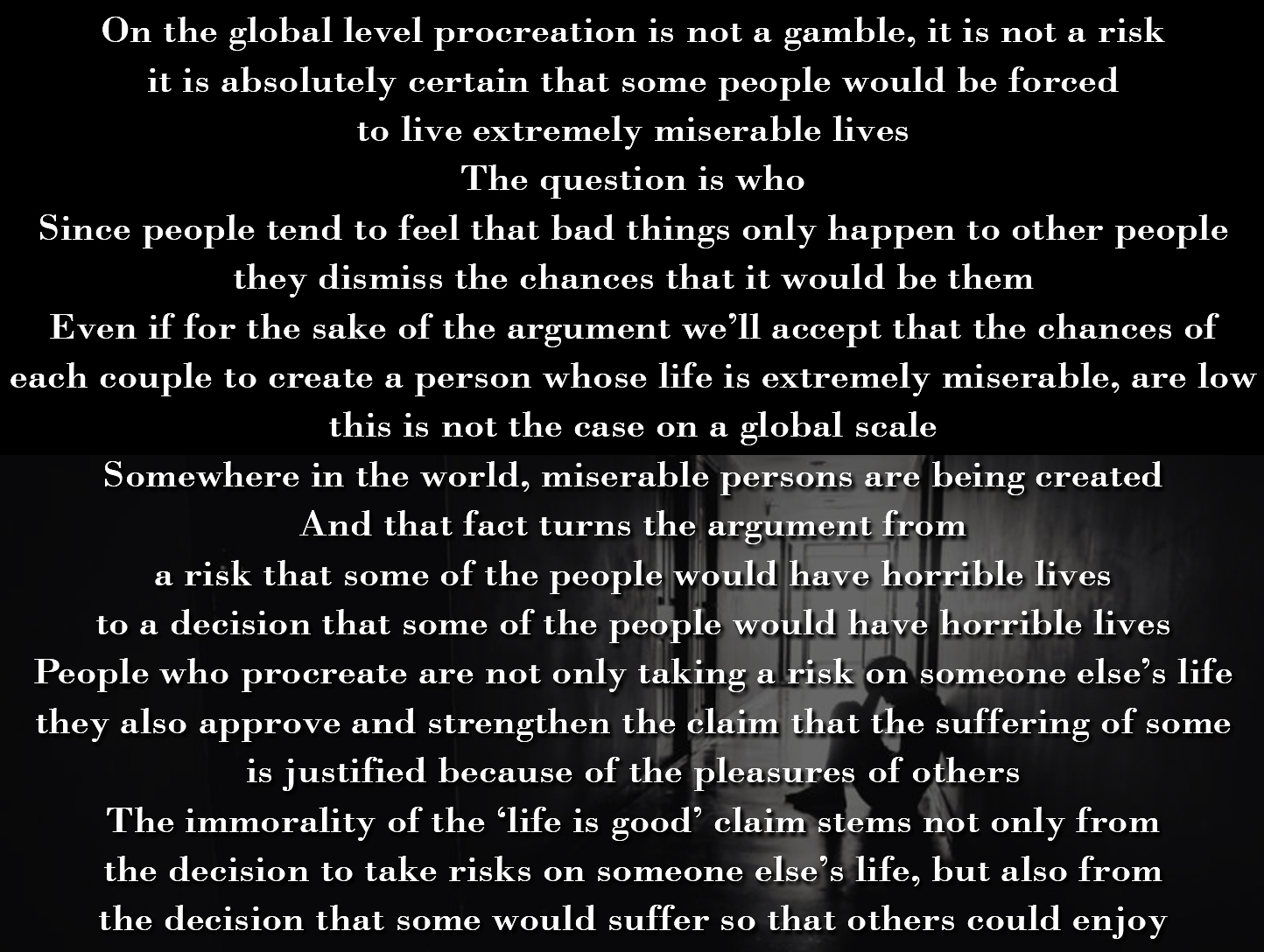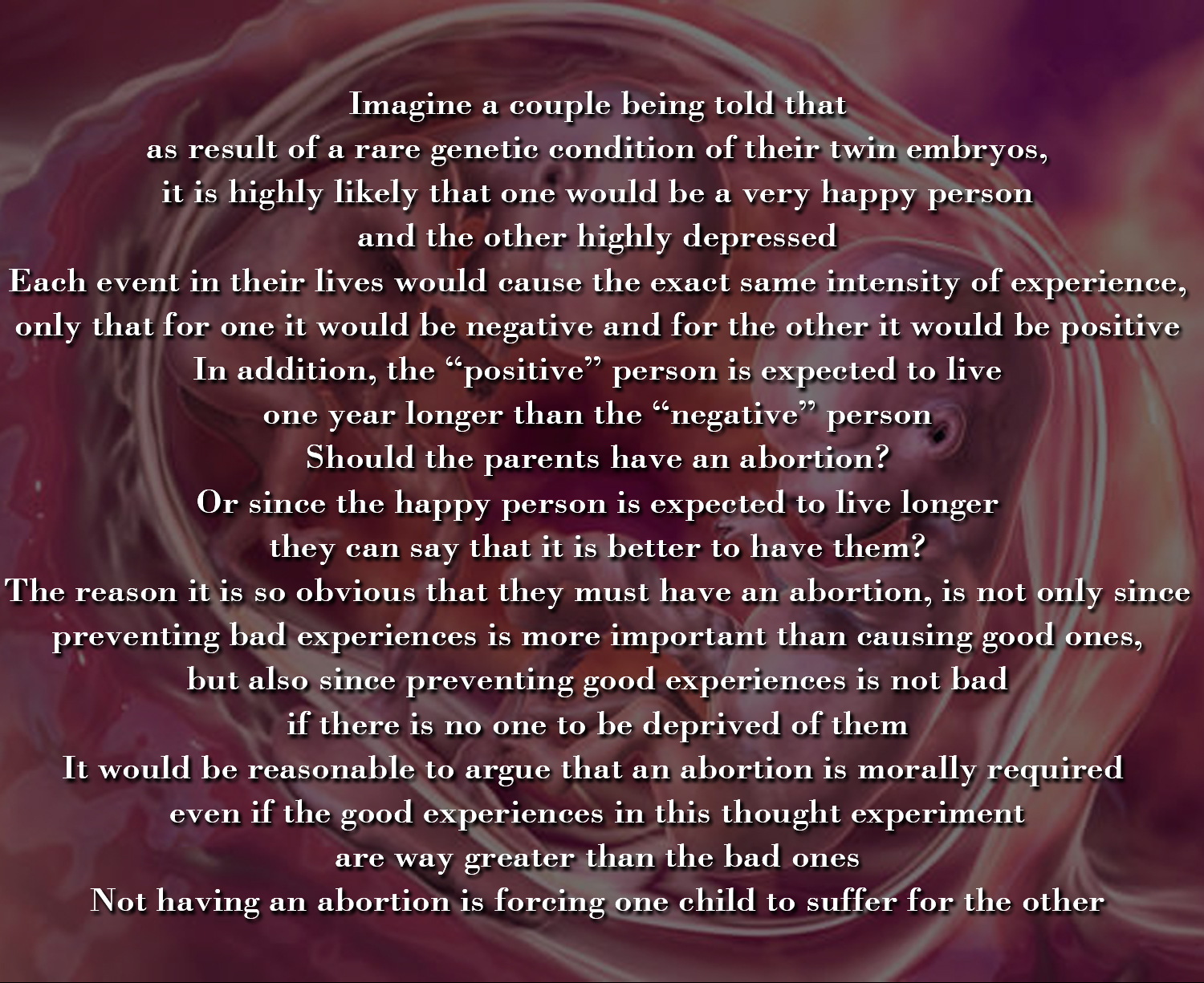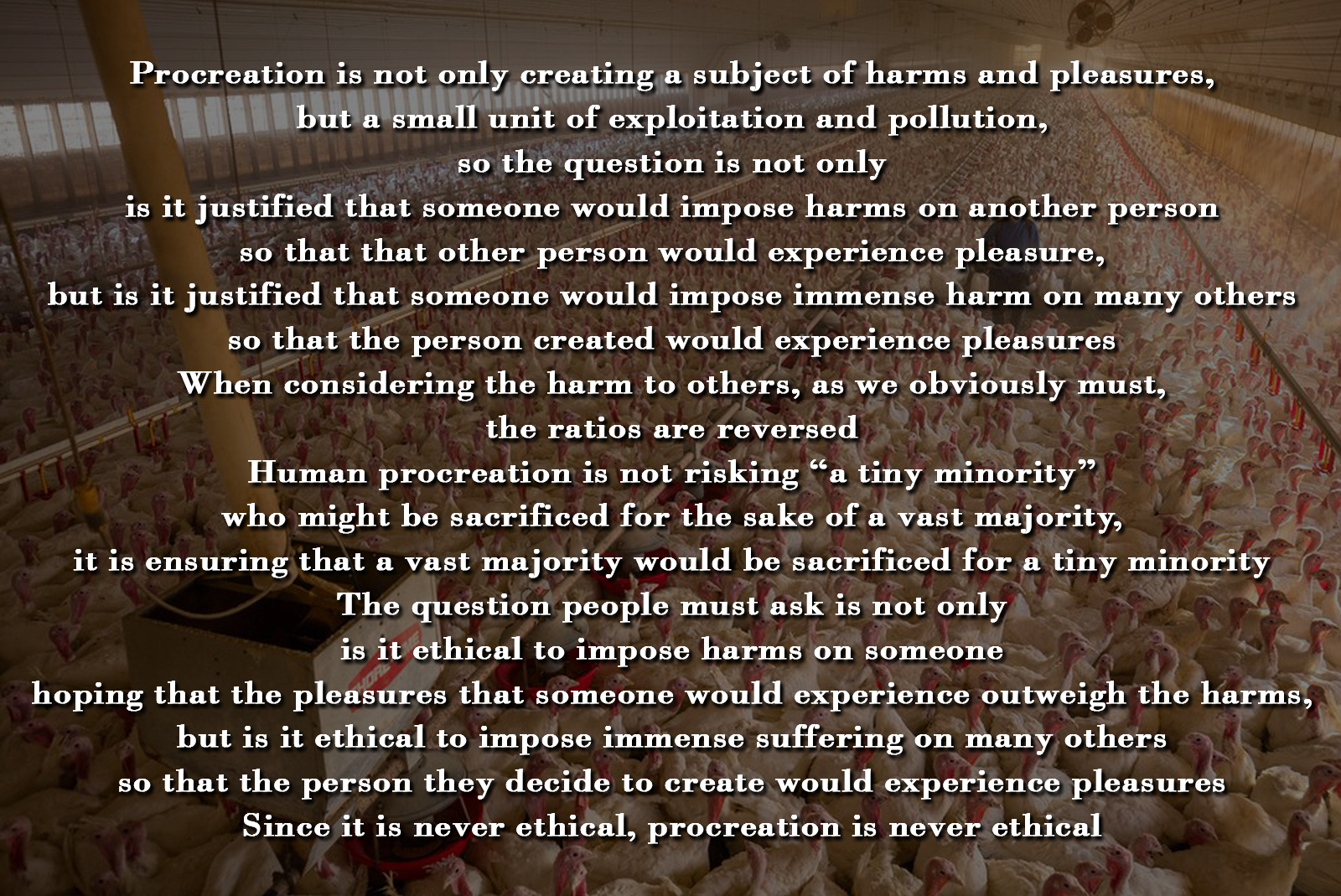One of the most common pro-natalist claims is that most people find their life good, and the ones who don’t, are only a tiny unfortunate minority, which we may be morally obligated to try and help, but not let these exceptional cases ruin it for everybody else.
One of the common bases for stating that it is “only” a tiny minority who feels this way, is the number of suicides. But that basis is false since, firstly, the number of people who think life is horrible is not equivalent to the number of suicides or suicide attempts. Secondly, even if it was, that number is quite high, especially considering how difficult it is for someone to decide to carry out suicide, let alone actualize it. The fact that the number of suicide attempts is so high despite the difficulty involved in this decision, should actually be very alarming and indicative of the counter argument. And thirdly, the common pro-natalist claim that the option of suicide is always available for anyone who has ‘a problem with life’, is false and merciless in itself regardless of statistics. However, this important issue deserves a separate reference which is addressed here.
In this text I will not focus on disproving the factual base of the ‘life is good’ claim, but on its morality.
The Sacrificial Aspect of Pro-natalism
Most pro-natalists don’t disagree that every life involves some level of pain, only that according to them, for the vast majority of people, these pains are outweighed by the pleasures of life. As argued in the text regarding Benatar’s asymmetry and his quality of life argument, I totally disagree with this chttp://nonvoluntary-antinatalism.org/critical-review-of-better-never-to-have-been-part-4-the-quality-of-life-argument/laim, but here I wish to focus on a different unethical projection implied by it.
Even if for the sake of the argument I’ll accept the claim that someone’s pains are justified by that someone’s pleasures, it is not the only thing pro-natalists are actually saying here. Given that lives not worth living are being created all the time, what they are actually saying is that some’s suffering is justified by the pleasures of others. And that’s a whole different level of moral wrongfulness.
Pro-natalists prefer to frame their argument this way: procreation is ethically justified since for most, the pleasures outweigh the pains. But the very same idea can be framed differently and imply that: procreation is ethically justified despite that for some, the pains of life outweigh the pleasures.
We can’t justify imposing existence on ones who prefer never to have exited, by claiming that there are many others who enjoy the life imposed on them. Ethically, we must prioritize the ones who would be imposed with something that they don’t want had they existed, over the ones who would not get something they would have wanted had they existed.
No one wanted to exist before they existed. Existence was forced on everyone. Some are satisfied with it, but they wouldn’t be unsatisfied had they never existed. However, the ones who are not satisfied, would rather that they had never existed. They can’t be compensated for the harm caused to them by forcing them into existence, and the ones who are satisfied wouldn’t need to be compensated for the absence of pleasures as they would not be deprived of them had they never existed.
Given that it would be impossible to compensate existing creatures in case their suffering is not justified in their eyes, and given that it is impossible to harm non-existing, the conclusion is not that it is always better never to have been (since the ones who are satisfied allegedly prove differently), but that it is always better not to procreate since the satisfied won’t be deprived of any pleasures, and the unsatisfied won’t be sacrificed for any others’ pleasures.
Perhaps using one of the most common antinatalist arguments – the risk argument, can make it clearer. Although I find it one of the strongest antinatalist arguments, I think there is something misleading in its common formulation. That is since on the global level procreation is not a gamble, it is not a risk, it is absolutely certain that some persons would be forced to live extremely miserable lives. The question is who. Since people tend to feel that bad things only happen to other people, they dismiss the chances that it would be them. Again, in this text I’ll not focus on disproving the factual base of the good life claim, so for the sake of the argument I’ll accept that the chances of each couple to create a person whose life is extremely miserable, are low. But this is not the case on a global scale. Somewhere in the world, miserable persons are being created. And that fact turns the argument from a risk that some of the people would have horrible lives, to a decision that some of the people would have horrible lives. People who decide to procreate are not only taking a risk on someone else’s suffering, they also approve and strengthen the claim that the suffering of some is justified because of the pleasures of others. The immorality of the ‘life is good’ claim stems not only from the decision to take risks on someone else’s life, but also from the decision that some would suffer so that others could enjoy.
Of course, there is a simpler and more intuitive aspect of sacrifice in procreation. Regardless of the quality of life, how happy or miserable a person is, or was expected to be before being created, no one is ever really created for their own sake. Everyone is created as means to other people’s ends, such as to take care of their parents when they are old, to heal their parents’ relationships, to continue the family line, to please the parents’ parents, to ease their parents boredom, to fill their parents’ life with meaning and purpose, to be soldiers, to push the economy by being consumers and workers, to treat society’s elderly, to continue the human race, and etc. Extremely emotional and physical vulnerable persons, which are mortal, and are aware at a very young age of their mortality, are being created for others’ interests. This is a very cruel sacrifice.
Tyranny of the Majority
This issue is not a question of volume. We don’t need a majority to decide in the case of procreation since there is no one who is harmed by not being created. There are no victims in non-existence. And there are victims in existence. So if anything, it is a binary issue, not one of majority rule.
And all it takes is one individual whose life is not worth living to make procreation unjustified. If life is not justified for one individual, life is not justified at all.
Imagine that you can create a world in which everyone is happy, except for a single individual who suffers. Would it be moral to create that world? I think not. That is since no one would be harmed by the absence of pleasures if that world won’t be created, but one individual would be harmed if it would. Creating that world despite the suffering of that individual is sacrificing that person for the pleasures of all the others, pleasures which they in no way would be missing. The same is implied by this specific pro-natalist argument. Individuals are forced into horrible lives so others can enjoy their lives.
In that sense procreation is treating some as means to others’ ends. Individuals are turned into vessels for others’ pleasures. That is since although individuals are being created by people who are hoping that all of them would enjoy their lives, they know that some won’t. That is sacrificing individuals for others’ pleasures. Some might argue that sacrificing individuals might be morally justified in some extreme cases, but all of them involve preventing greater suffering, not bestowing pleasures.
Individuals can theoretically be compensated for their suffering by pleasures, but if that doesn’t happen, there is no way to compensate them for their suffering, certainly not by others’ pleasures. Existence forces a situation in which one might be miserable and there is no way to compensate that person for that misery. It is an unjustified suffering, with no good reason to take place, and with no good reason not to prevent.
Once there is an option for creating a life not worth living, procreation is ethically undefendable. The way it is nevertheless being defend by is the tyranny of the majority.
Balancing pain and pleasure might successfully counter the pinprick argument, but it can’t successfully counter the consent argument, or a threshold argument (everyone must feel that their lives are at least worth living) or the worse off argument.
No one’s suffering should be justified by the pleasures of others, no matter how many others there are, and how great the pleasures are, when the alternative is that no one would exist to seek pleasures and no one would ever feel pain.
The Harm to Others
But of course, this discussion is substantially partial. Procreation is not only creating a subject of harms and pleasures, but a small unit of exploitation and pollution, so the question is not is it justified that someone would impose harms on another person so that that other person would experience pleasure, but is it justified that someone would impose immense harm on many others so that the person created would experience pleasures.
When considering the harm to others, as we obviously must, the ratios are reversed. Human procreation is not risking “a tiny minority” who might be sacrificed for the sake of a vast majority, it is ensuring that a vast majority would be sacrificed for a tiny minority.
The question people must ask is not only is it ethical to impose harms on someone (hoping that the pleasures that someone would experience outweigh the harms), but is it ethical to impose immense suffering on many others so that the person they decide to create would experience pleasures. Since it is never ethical, procreation is never ethical.
And since people don’t even take seriously the possibility that their own children might suffer extremely, there is no chance they would ever take seriously the certainty that sentient creatures would extremely suffer because of their procreation. That’s why we mustn’t wait until people would understand that it is ethically impossible to justify procreation, but do everything we can to make it impossible to procreate.
References
Benatar David, Better Never to Have Been (Oxford: Oxford University Press, 2006)
Benatar David and Wasserman David, Debating Procreation: Is It Wrong to Reproduce?
(Oxford: Oxford University Press, 2015)
Shiffrin, Seana. Wrongful Life, Procreative Responsibility, and the Significance of Harm
Legal Theory 5, no. 2 (1999): 117–48




Leave a Reply